The conflict between the two countries has increased after Ukraine was accused of attempting to assassinate Russian President Vladimir Putin. As aggression escalated, the Russian military has stepped up attacks on Ukraine, followed by explosions from Ukraine’s capital Kiev to Odessa.
More than fourteen months after Russia’s invasion of Ukraine, the crisis is not abating. Following the drone attack on the Russian presidential palace, Russia accused Ukraine of attempting to kill President Vladimir Putin. After this, the aggression of the Russian army has increased suddenly. The action of the Russian army has intensified in the eastern region of Ukraine. People here heard the sound of explosions on Thursday morning as well. Ukraine’s regional military administration said all air defense systems in Kiev were working and the military was doing its best to rescue people.
The Russian army carried out vigorous attacks in Kherson, in which 21 people died. Ukraine’s President Volodymyr Zelensky himself informed that 48 people were also injured in these attacks. Ukrainian officials said 12 people were killed in the Russian airstrikes in the city itself, while the search for the dead continued in nearby villages. So far nine have been confirmed dead. Curfew continues in Kherson amid these attacks. Meanwhile, a drone attack by Ukraine caused a fire at an oil refinery in southern Russia. The attack from the Ukrainian side took place near the Ilsky refinery, which is located in Novorossiysk, close to the Black Sea port. It was claimed that a large oil storage was on fire. Earlier, a fuel depot in Russia’s Krasnodar region caught fire during Ukraine’s alleged attack. This area is very close to the bridge connecting Russia and Crimea.
Tag: ukraine
-

Ukraine’s capital Kiev exploded, know what is the reason
-
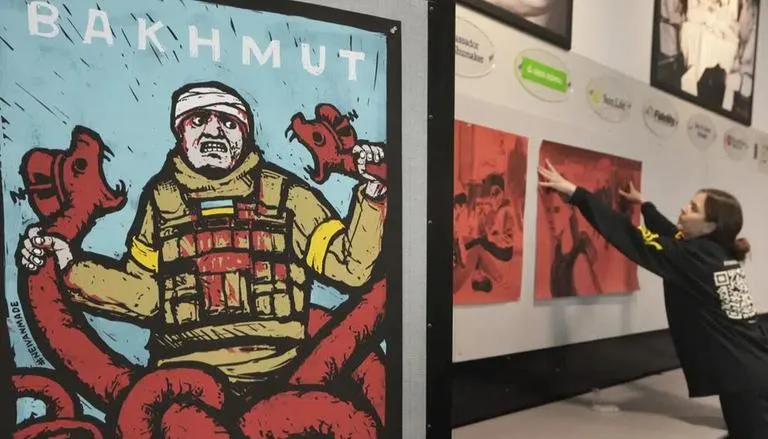
Ukrainian Artists To Russia: ‘Our Fire Is Stronger Than Your Bombs’
As Ukrainian artists Jenya Polosina and Anna Ivanenko watched missiles descend on their country , the two decided to use their creativity to push back against Russia’s invasion. Working in the early days of the war from bunkers or sometimes without electricity and water in Kyiv, they and other artists started drawing.
Some of their war posters are now on display in New Hampshire. In the exhibit entitled “Our Fire is Stronger Than Your Bombs,” posters from Ivanenko show children studying in a bomb shelter and Ukrainians fleeing the country soon after the war started. Polosina’s drawings celebrate a female gymnast and a young mathematician who were killed in missile strikes.
“We understood that it’s a good pill, a good medicine for not panicking, for keeping yourself together. So, we started drawing,” Ivanenko told The Associated Press from the studio in Kyiv she shares with Polosina. They are among eight artists who contributed 20 posters to the exhibit at the New Hampshire Institute of Politics in Manchester that opened Monday. The posters were shown previously at Dartmouth College and still can be seen as part of a digital exhibit.
Before the war, Polosina was producing illustrations for books and advertising that focused on social themes like human rights and Ukraine’s largest LGBTQ rights event, KyivPride.
Ivanenko did book and advertising projects. But they quickly turned their focus to the war and, through Instagram, shared their images. They have been joined by scores of other Ukrainian artists who produce graphic novels, comics and other types of media to spread the news about the war.
The colorful and a times startling posters produced last year have helped rally support for the war among their fellow Ukrainians, raise money for the war effort as well as give them something to do. The posters have also become part of a growing digital effort to draw attention around the globe to the invasion and its impact on Ukraine.
“One hundred pictures from illustrators in Ukraine … are helping to grow awareness about what is happening and then that will have an impact on those who make decisions,” Polosina said.
Polosina said the opportunity to show their work in New Hampshire “is very important for us because this is almost direct communication with viewers outside of Ukraine that can see our reflections, that can see our feelings and be more sympathetic.”
Some of the posters on display in New Hampshire have the feel of classical war propaganda aimed at raising the spirits and rallying residents.
One shows four people staring up at a missile featuring the Russian coat of arms and the words “Our Fire Is Stronger Than Your Bombs.” Another shows two people holding the Ukrainian flag in Kherson next to the words from the Ukrainian national anthem, “And We Will Show Brothers That We Are Of The Cossack Nation.” Russian had taken over Kherson in the early days of the war and Ukraine retook it late last year.
Others serve to document the most dramatic events of the war like the Mariupol theater attack or fighting in Bakhmut , which has become the longest-running battle since Russia launched its full-scale invasion more than a year ago. That poster features a soldier, blood on his chest and white bandages on his head, gripping a red snake in each hand that represent Russian forces struggling to encircle the city. Another shows masked workers in white hazmat suits exhuming a mass grave.
Ivanenko described how she was “charged with rage” and a “desire to stop the war, stop the aggressions” whenever she hears about explosions or another collapsed building in Ukraine. So her posters are her effort to help “in a small way.”
Some are more like diary entries of the artists, documenting the daily struggles they encounter. Along with the posters of children and family impacted by the war, one shows children with reflective vests playing, a reference to the precautions they often take during frequent blackouts.
“We focus mostly on some things that are related to our experiences because it’s feels little bit more true to us,” Ivanenko said. “Of course, some things we hear about in the media, it’s also our experience. You can’t stay indifferent to everything.”
The exhibition was the inspiration of Veronika Yadukha and Hanna Leliv, translators who fled Ukraine and arrived in the United States in September. They are both at Dartmouth and felt that an exhibit of war posters chronicling the first year of the war would be a way to overcome American fatigue around the long-running conflict.
“People get tired very quickly of these horrific events and the news. Usually, when we see the photographs or videos, our mind blocks all this stressful information,” Yadukha said. “I realized that these pictures or illustrations work as an alternative media … People see these pictures. There is space between the real life and the message. They get the information which is the essential thing.”
In Manchester, Yadukha and Leliv spent Monday putting up the posters, which were printed at Dartmouth from digital files provided by the artists. About 60 people came out for the opening, listening to the artists speak about creating the posters and listening to Ukrainian poetry that was inspired by the war.
“It’s devastating,” said Mary Fuller, a homemaker and former teacher from Concord who had come to the exhibit opening. “It’s devastating what these people are going through for money and power. But that is the world … This is the reality and the depth of the war. It’s not superficial. You can feel it in these pictures.”
-
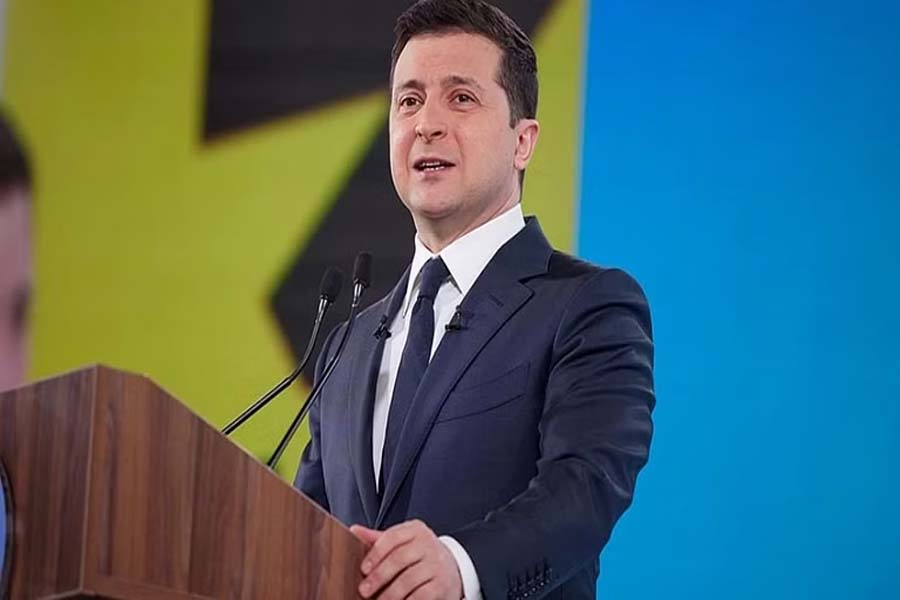
Ukraine’s Zelenskyy visits International Criminal Court
KYIV: Ukrainian President Volodymyr Zelenskyy on Thursday made an unannounced visit to the International Criminal Court, which has issued an arrest warrant for Russian President Vladimir Putin for alleged war crimes in Ukraine.
The visit came a day after Zelenskyy denied that Ukrainian forces were responsible for what the Kremlin called an attempt to assassinate Putin in a drone attack on Moscow. The Kremlin promised retaliation for what it termed a “terrorist” act.
On a visit to Helsinki on Wednesday, Zelenskyy told reporters: “We didn’t attack Putin. We leave it to (the) tribunal” — an apparent reference to the ICC.
Ukraine’s military claimed three Russian drones that hit the southern city of Odesa early Thursday had “for Moscow” and “for the Kremlin” written on them, seemingly referring to the strikes in Moscow. Also, Kyiv was the target of an air attack for the third time in four days.
In total, Ukraine’s Air Forces intercepted 18 out of 24 Iranian-made drones launched by Russian forces in various regions. No casualties were reported.
Zelenskyy, meanwhile, was visiting The Hague, which hosts the ICC as well as the United Nations’ top judicial organ, the International Court of Justice. The Dutch city calls itself the international city of peace and justice.
Zelenskyy was welcomed outside the ICC building by the court’s president, Poland’s Piotr Hofmanski. Staff crowded at windows to get a glimpse of Zelenskyy’s arrival and raised a Ukrainian flag next to the court’s own flag outside the building.
Judges at the ICC last month announced they found “reasonable grounds to believe” that Putin and his commissioner for children’s rights were responsible for the unlawful deportation and transfer of children from occupied areas of Ukraine to Russia. But the chances of Putin standing trial in The Hague are remote. The court does not have a police force to execute its warrants, and the Russian leader is unlikely to travel to any of the ICC’s 123 member states that are under an obligation to arrest him if they can.
The ICC said in a March 18 statement that Putin “is allegedly responsible for the war crime of unlawful deportation of (children) and that of unlawful transfer of (children) from occupied areas of Ukraine to the Russian Federation.” ICC Prosecutor Karim Khan has made repeated visits to Ukraine and is setting up an office in Kyiv to facilitate his ongoing investigations.
However, the ICC does not have jurisdiction to prosecute Putin for the crime of aggression — the unlawful invasion of another sovereign country. The Dutch government has offered to host a court that could be established to prosecute the crime of aggression and an office is being established to gather evidence.
The new International Centre for Prosecution of the Crime of Aggression should be operational by summer, the European Union’s judicial cooperation agency, Eurojust, said in February.
Questions continued to swirl around Russia’s claim that it foiled an attack by Ukrainian drones on the Kremlin early Wednesday.
Putin wasn’t in the Kremlin at the time and was at his Novo-Ogaryovo residence outside Moscow, his spokesman Dmitry Peskov told Russia’s state news agency RIA Novosti.
There was no independent verification of the purported attack, which Russia authorities said occurred overnight but presented no evidence to support it. Questions also arose as to why it took the Kremlin hours to report the incident and why videos of it also surfaced later in the day.
White House press secretary Karine Jean-Pierre said the US was “unable to confirm the authenticity” of Russia’s claims of a Ukrainian attack on Moscow. Asked whether the US believed Putin was a lawful target of any potential Ukrainian strike, Jean-Pierre said that since the start of the conflict, the US was “not encouraging or enabling Ukraine to strike beyond its border.” Asked whether the US was concerned that the accusation might have been a false flag operation by Russia to serve as a pretext for more aggressive military action on Ukraine, Jean-Pierre said she didn’t want to speculate, but added, “Obviously Russia has a history of doing things like this.” The Netherlands has been a strong supporter of the Ukrainian war effort since Russia’s invasion last year. Among military equipment Prime Minister Mark Rutte’s government has promised are 14 modern Leopard 2 tanks it is buying together with Denmark. They are expected to be delivered next year. The Netherlands also joined forces with Germany and Denmark to buy at least 100 older Leopard 1 tanks for Ukraine.
Among other military hardware, it also sent two Patriot air defence missile systems and promised two naval minehunter ships as well as sending military forensic experts to assist war crime investigations. Zelenskyy’s visit came on the day the Dutch remember their war dead.
Two Russian oil facilities in southern regions of the country near Ukraine were attacked by drones in what appeared to be a series of attacks on fuel depots behind enemy lines, Russian media said Thursday. Four drones struck an oil refinery in the Krasnodar region, Russian state news agency RIA Novosti reported, citing law enforcement sources. Another facility was reportedly hit in the neighbouring Rostov region.
-

Russia Alleges Ukraine Attempted To Assassinate Russian President Vladimir Putin
Russia, in an explosive claim, has said that it foiled the assassination attempt made by Kyiv on Russian President Vladimir Putin. Kremlin alleged that Kyiv carried out drone strikes to take down the Russian President, the Kremlin press service claimed.
According to Kremlin, Ukraine President Volodymyr Zelenskyy-led regime made a concrete attempt to launch a drone strike on Putin’s Kremlin residence last night. At least two drones were targeted at Russia’s President’s Kremlin home. “As a result of the actions of the military and special services, the devices were disabled,” the Kremlin press service said on May 2. No casualties were reported. The fragments of the damaged drone fell into the Kremlin premises. The attempt of assassination came on the eve of the planned counteroffensive of the Armed Forces of Ukraine. Kremlin-linked channels reported that the drone was launched by the Ukrainian saboteurs who tried to attack the Kremlin “in the very heart of Russia. In fact, this is an attempt on the life of the President of the Russian Federation and fracture the Russian military machine as a whole.”
Earlier at a state presser, Putin’s spokesperson Dmitry Peskov had warned that Russia reserves the right to respond to an attempted strike on the Kremlin, “where and when it sees fit.”The question now remains how exactly Russia will respond. Kremlin on Wednesday labelled the attack on Kremlin as a “planned terrorist act.” It was strategically carried out on the eve of Victory Day. As an operational measure, Kremlin has banned the use of UAVs in the city today.
READ | Russia’s Victory Day: Celebrations muted, parades scrapped to ‘not provoke’ Kyiv amid war
“As a result of the terrorist attack, the president was not injured; his work schedule has not changed, and continues as usual,” according to Kremlin. -
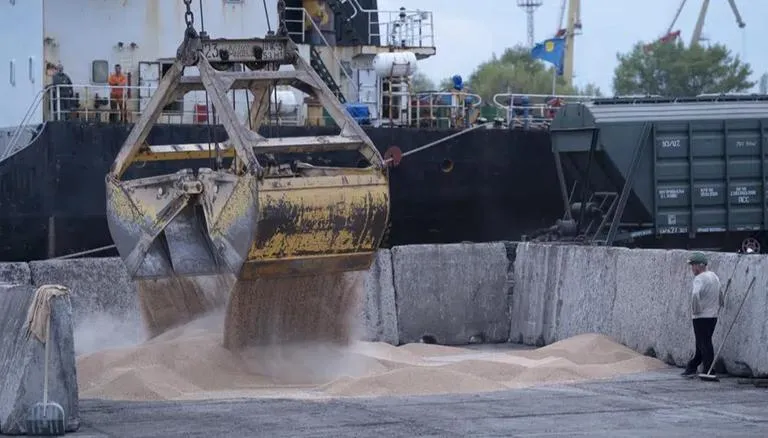
Ukraine Hails EU’s Hard-fought Deal To Resolve Farm Exports Issue
Ukraine on Saturday welcomed the European Union’s hard-fought deal to keep farm exports flowing into and through the bloc to world markets, saying that the Middle East and Africa would specifically stand to benefit from it.
Late Friday, the 27-nation EU ended a damaging internal standoff over a destabilising glut of Ukraine farm imports by granting five eastern member countries the right to temporarily ban the most problematic produce while allowing all farm products to transit onward.
Resolving the issue allows the EU to maintain a unified stance in the face of Russia’s invasion of its neighbor. “We welcome that we resolved this issue,” Ukrainian Finance Minister Sergii Marchenko said at a meeting of EU finance ministers in Stockholm.
Under the deal, Poland, Hungary, Slovakia, Bulgaria, and Romania can keep four farm products that make up the overwhelming mass of exports from Ukraine out of their local markets but must guarantee unfettered access to the rest of the bloc.
Since Russia’s invasion of Ukraine hampered Black Sea shipments of Ukrainian agricultural products, using the 27-nation bloc as a transportation route has been essential to getting the nation’s prized cereal production onto the world.
“We found a wise decision that would help Ukraine to export necessary commodities, food commodities towards African countries, which is so necessary for them,” Marchenko said, adding Middle East nations would equally profit.
Under the deal, the bloc would basically accept the national bans on four of the five main products — wheat, maize, rapeseed, and sunflower seeds — that account for most imports. The EU would also assess whether other products, including sunflower oil, should also be included.
As an added sweetener, the EU provided 100 million euros ($113 million) more in special aid on top of on an initial support package of 56.3 million euros to help farmers in the affected countries.
On Friday, EU nations also tentatively agreed to lift tariffs on Ukraine’s grains for another year. The EU lifted duties on Ukrainian grain to facilitate its transport to Africa and the Middle East by other routes after a Russian blockade kept cargo from leaving Ukraine’s ports.
Overall, there was an acceptance that lifting import tariffs had seriously skewed the local markets in nations closest to Ukraine. In Poland, wheat imports went from 2,375 tons in 2021 to 500,008 tons last year. Maize went from 5,863 tons to more than 1.8 million over the same period.
-
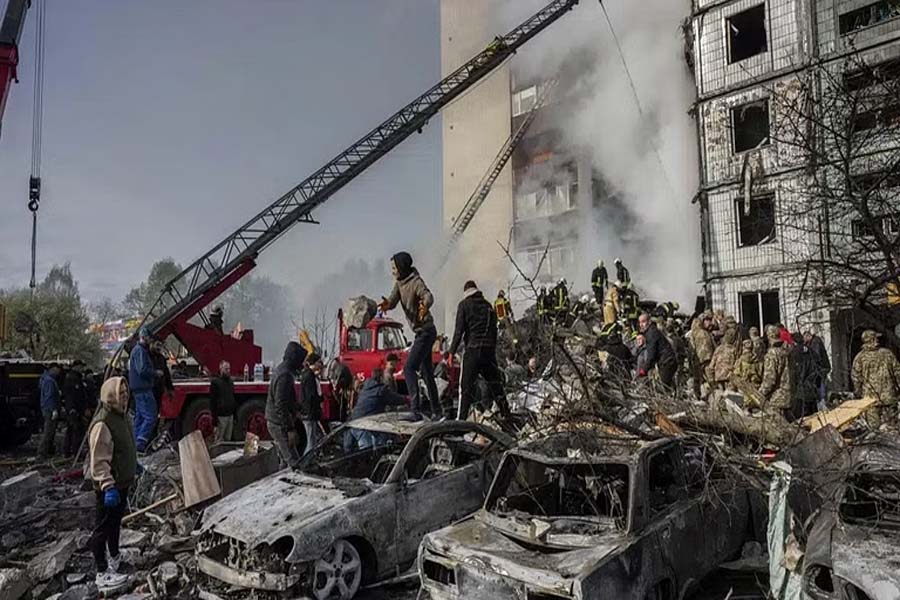
Russian missile and drone attack in Ukraine kills 16 people
UMAN: Russia fired more than 20 cruise missiles and two drones at Ukraine early Friday, killing at least 16 people, most of them when two missiles slammed into an apartment building in the center of the country, officials said. Three children were among the dead.
The missile attacks included the first one against Kyiv, Ukraine’s capital, in nearly two months, although there were no reports of any targets hit. The city government said Ukraine’s air force intercepted 11 cruise missiles and two unmanned aerial vehicles over Kyiv.
The strikes on the nine-story residential building in central Ukraine occurred in Uman, a city located around 215 kilometers (134 miles) south of Kyiv. Fourteen people died in that attack, according to the interior ministry, including two 10-year-old children and a toddler.
Another of the victims was a 75-year-old woman who lived in a neighboring building and suffered internal bleeding from the huge blast’s shock wave, according to emergency personnel at the scene.
The Ukrainian national police said 17 people were wounded and three children were rescued from the rubble. Nine were hospitalized.
The bombardment was nowhere near the war’s sprawling front lines or active combat zones in eastern Ukraine, where a grinding war of attrition has taken hold. Moscow has frequently launched long-range missile attacks during the 14-month war, often indiscriminately hitting civilian areas.
Ukrainian officials and analysts have alleged the strikes are part of a deliberate intimidation strategy by the Kremlin. Russia has denied its military aims at civilian targets.
Survivors of the Uman strikes recounted terrifying moments as the missiles hit when it still was dark outside.
Halyna, a building resident, said she and her husband were covered in glass by the blast. They saw flames outside their window and scrambled out, but first Halyna checked whether her friend in a neighboring apartment was OK.
“I was calling, calling her (on the phone), but she didn’t pick up. I even rang the doorbell, but still no answer,” she told The Associated Press. She used the spare keys from her friend’s apartment and went inside to check on her. She found her lying dead on her apartment floor.
Halyna refused to provide her last name out of security concerns. Another building resident, Olha Turina, told the AP that glass from the explosion flew everywhere.
Turina, whose husband is fighting on the front lines, said one of her child’s classmates was missing. “I don’t know where they are, I don’t know if they are alive,” she said. “I don’t know why we have to go through all this. We never bothered anyone.”
Three body bags lay next to the building as smoke continued to billow hours after the attack. Soldiers, civilians and emergency crews searched through the rubble outside for more victims, while residents dragged belongings out of the damaged building.
One woman, crying in shock, was taken away by rescue crews for help.
A 31-year-old woman and her 2-year-old daughter were also killed in the eastern city of Dnipro in another attack, regional Governor Serhii Lysak said. Four people were also wounded, and a private home and business were damaged.
The attacks came days after President Volodymyr Zelenskyy said that he and Chinese leader Xi Jinping held a “long and meaningful” phone call where Xi said his government will send a peace envoy to Ukraine and other nations.
Ukrainian Foreign Minister Dmytro Kuleba said that Friday’s bombardment showed the Kremlin isn’t interested in a peace deal.
“Missile strikes killing innocent Ukrainians in their sleep, including a 2-year-old child, is Russia’s response to all peace initiatives,” he tweeted. “The way to peace is to kick Russia out of Ukraine.”
In Kyiv, fragments from intercepted missiles or drones damaged power lines and a road in one neighborhood. No casualties were reported.
Ukraine officials said last week that they had taken delivery of American-made Patriot missiles, providing Kyiv with a long-sought new shield against Russian airstrikes, but there was no word on whether the system was used Friday.
The city’s anti-aircraft system was activated, according to the Kyiv City Administration. Air raid sirens started at about 4 a.m., and the alert ended about two hours later.
The missile attack was the first on the capital since March 9. Air defenses have thwarted Russian drone attacks more recently.
The missiles were fired from aircraft operating in the Caspian Sea region, according to Ukrainian Armed Forces Commander in Chief Valerii Zaluzhnyi.
Overall, he said, Ukraine intercepted 21 of 23 Kh-101 and Kh-555 type cruise missiles launched, as well as the two drones.
The war largely ground to a halt over the winter, becoming a war of attrition as each side has shelled the other’s positions from a distance. Ukraine has been building up its mechanized brigades with armor supplied by its Western allies, who have also been training Ukrainian troops and sending ammunition.
NATO announced on Thursday that its allies and partner countries have delivered more than 98% of the combat vehicles promised to Ukraine during Russia’s full-scale invasion and war, as Kyiv eyes a possible counteroffensive.
-

One dead, 23 wounded in Russian missile strike on Ukraine’s Mykolaiv
KYIV: One person was killed and 23 people, including a child, were wounded in a Russian missile strike on an apartment block and houses in the southern Ukrainian city of Mykolaiv in the early hours of Thursday, officials said. “At night, Russia bombarded Mykolaiv with four Kalibr missiles launched from the Black Sea,” President Volodymyr Zelenskiy said on the Telegram app.
“The high-precision weapons were aimed at private houses, a historic building, and a high-rise building. For now, we know about one dead and 23 wounded, including a child.” A video posted by Zelenskiy showed badly damaged buildings with smashed windows and smoke rising above the roofs.
Regional governor Vitaliy Kim said the emergency services put out several fires caused by the missile debris and that they were clearing the rubble. Russia denies deliberately targeting civilians in its full-scale invasion that has killed thousands of people, uprooted millions and destroyed towns.
Mykolaiv, a shipbuilding centre and port, had a population of about 470,000 people before the war. The city has suffered heavy Russian bombardments throughout the war.
-

Ukrainian minister to visit India on April 9, likely to seek humanitarian aid
New Delhi (IANS) | Emin Dzhaparova, the country’s First Deputy Minister of Foreign Affairs, will be on a four-day official visit to India on Sunday in the first official visit from Ukraine after Russia’s invasion more than a year ago. Zhaparova will be on an official visit to India from April 9-12, during which she is expected to seek humanitarian aid for her home country.
During the visit, she will hold talks with Sanjay Verma, Secretary (West) in the Ministry of External Affairs, where the two sides are expected to discuss bilateral relations, current situation in Ukraine and exchange views on global issues of mutual interest.
Official sources said she will also meet Minister of State for External Affairs Meenakshi Lekhi and Deputy National Security Advisor Vikram Misri.
“India shares warm and friendly relations and multifaceted cooperation with Ukraine. In the last 30 years of establishment of diplomatic relations, bilateral cooperation between the two countries has seen significant progress in the fields of trade, education, culture and defence,” an official statement said. We have made progress. The visit will be an opportunity to further mutual understanding and interests.”
–IANS
-
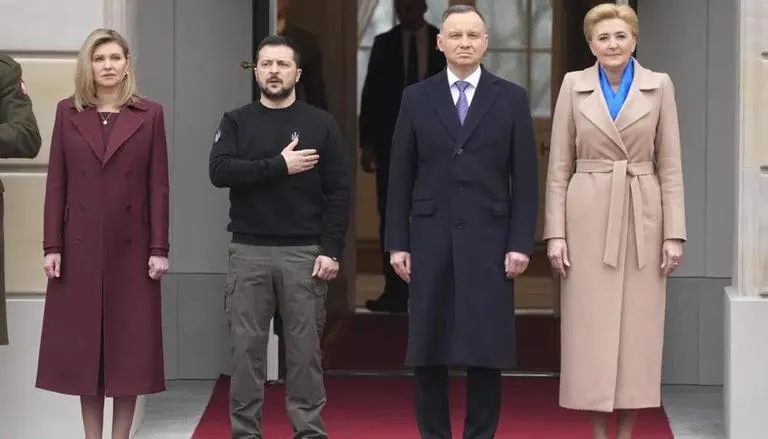
Poland To Keep Helping Ukraine Fight Off Russia: Polish President To Zelenskyy
Poland has emerged as one of Ukraine’s most ardent supporters during Russia’s invasion despite historical grievances between the neighbouring nations that stir up bad feelings to this day.
The tensions between the country at war and its staunch ally were acknowledged Wednesday when Ukrainian President Volodymyr Zelenskyy made a state visit to Poland, where President Andrzej Duda received him with honours.
Duda promised that Poland would keep helping Ukraine fight off Russia’s aggression, but he also acknowledged at a joint news conference with Zelesnkyy that the relationship was complicated.
”There are still open wounds in the memory of many people,” Duda said, an obvious reference to the massacres of some 100,000 Poles by Ukrainian nationalists during the 1940s. Poland considers the killings genocide.
The difficult part in Poland-Ukraine relations goes back even further than that. In a part of Europe where entire nations have disappeared from maps for generations before returning from the ashes of collapsed empires, sometimes at the expense of neighbors, Poles and Ukrainians share a history of the existential rivalry.
-
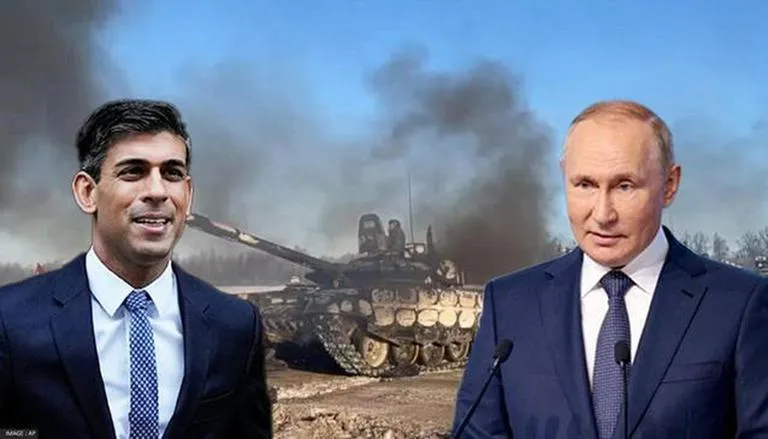
Russia Warns UK Against Supplying Depleted Uranium To Ukraine, Cites Global Concerns
During talks in Moscow on Tuesday alongside Chinese President Xi Jinping, Russian President Vladimir Putin cautioned London against sending depleted uranium (DU) armour-piercing tank rounds to Ukraine, stating that Moscow will view the weapons as containing “nuclear components”. Putin made the remarks in response to British plans to include DU munitions in a future delivery of Challenger 2 main battle tanks.
I would like to note that if this happens, then Russia will be forced to react accordingly, bearing in mind that the collective West has already started to use weapons with a nuclear component,” he stated, according to RT.
While attending the Russia-China talks, Russian Defense Minister Sergey Shoigu also issued a warning, stating that the delivery of depleted uranium (DU) armour-piercing tank rounds to Ukraine would bring the world one step closer to a nuclear disaster.
In response to a written inquiry, UK Minister of State at the Ministry of Defence, Annabel Goldie, announced on Monday the upcoming delivery of depleted uranium (DU) rounds to Kyiv, describing them as a highly effective weapon.
“Alongside our granting of a squadron of Challenger 2 main battle tanks to Ukraine, we will be providing ammunition including armour-piercing rounds which contain depleted uranium. Such rounds are highly effective in defeating modern tanks and armoured vehicles,” Goldie said.
Depleted uranium (DU) munitions have been the focus of much international debate, with opponents of their use drawing attention to the material’s toxicity and radioactivity. DU is utilised in the construction of armour-piercing rounds to create hardened cores, which are particularly effective due to its high density. However, upon impact, the core of the round vaporises, creating an aerosol that spreads and contaminates the environment with uranium.
The United Nations (UN) has raised concerns over the UK’s plans, with Farhan Haq, a spokesman for Secretary-General Antonio Guterres, stating at a media briefing that the international organisation has previously expressed alarm about the use of depleted uranium (DU) and the suppliers of such weapons. The UN has consistently voiced concerns about the potential consequences of DU use.